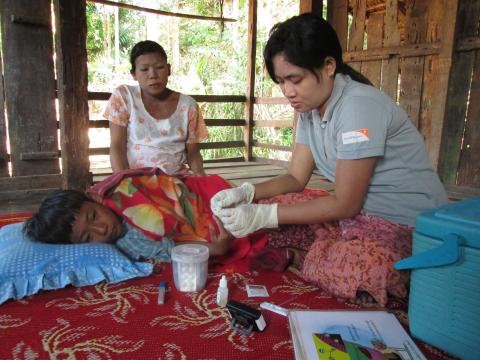Educating parents fights malaria

Grant project name: "Beating the old killer: responding malaria and related development issues through empowering people infected and affected by malaria"
Funded by: Global Fund - Round 9
Time frame: 4 years (2013 - 2016)
Purpose and Objective: As a response to a growing concern to control malaria, World Vision Myanmar has been implementing a Malaria project named “Beating the old killer: responding malaria and related development issues through empowering people infected and affected by malaria” in close collaboration with the National Malaria Control Programme, Department of Health.
Funded by the Global Fund from 2013 until the end of 2016, the 4-year project aims to reduce the number of people getting sick and dying of malaria, consequently contributing to the country’s socio-economic development and to the Millennium Development Goals.
Target population:
- 185,510 people, consisting of migrant workers, labourers working in high risk areas such as farms, agricultural lands, rubber plantations, and forests, fishermen and pregnant women and children under 5 years of age living in high risk villages.
- Ethnic groups such as Chin, Kayin, Kayah, Kayan and Pashue become accessible to malaria prevention, diagnosis and treatment services due to the project.
Location:
- Eight areas severely affected by malaria for many years, mostly located along the Thailand-Myanmar border: Kawthaung, Myeik, Palaw Dawei, Launglon and Thayetchaung in Tanintharyi Division; Loikaw Township in Kayah state; and Tiddim district in Chin state.
Meet a young man benefitting from this project:
Aung, 8, is in grade 3, and lives with his parents and siblings in a village situated along the bank of a river in Myeik Township, Tanintharyi Division.
Most of the families in Aung's village rely on odd jobs and struggle for their daily living, and Aung’s parents are no different, working to feed their five children in paddy fields and rubber plantations, or sometimes doing traditional river fishing.
“I would rather go find work to earn money for my family or stay at home, rather than attend those kind of discussions,” replied Daw Yu Htay, Aung’s mother, when asked by volunteers and her neighbours to attend health awareness sessions.
I did not believe malaria was transmitted by mosquitos. - Daw Yu Htay
Daw Yu Htay works odd jobs in her village, earning about 3000 kyats (around $3 US) each day.
“Although I was invited to attend malaria behaviour change discussions often, I never attend because I thought it is not important,” she said. “Sometimes we slept with an insecticide net, but sometimes we did not. I did not believe the transmission was from mosquito biting.”
One day, Aung got a fever.
“I gave him some medicines which I bought from the local shop that I use to treat my children when they are sick,” Daw Yu Htay said.
“My neighbours asked me to take my son for a malaria blood test, but I just ignored them,” Daw Yu Htay recalls.
Three days later, her son’s fever became even worse. “I could not swallow food and felt pain in my head and stomach,” recalls Aung.
Daw Yu Htay finally accepted the help of a World Vision volunteer. Aung’s blood test came back positive; he was seriously ill with Plasmodium Vivax (PV) malaria. PV is one of the five species of malaria parasites that commonly infect humans.
Despite the health volunteer's urging, Daw Yu Htay didn’t want to take Aung to the rural health centre, because she had no money. However, the volunteers encouraged her to take him, and accompanied them.
From there, Aung was promptly sent to the hospital, where he received the necessary treatment. He recovered quickly, and is back at school enjoying his lessons.
World Vision paid for Aung’s medical fees and transportation charges.
Now I have changed. We sleep with long lasting insecticide net every night. - Daw Yu Htay
“My son survived because World Vision helped us. I would regret my whole life if my son was dead from malaria. Because of lack of health knowledge, I had neglected my children, but now I have changed,” says Daw Yu Htay.
“We sleep with long lasting insecticide net every night. I keep my children from being bitten by mosquitoes,” she declared.
Now, Daw Yu Htay not only actively participates in awareness raising sessions but also encourages her neighbours to sleep with insecticide treated bed nets.
The project mobilises the community group in various ways such as organising regular meetings and trainings for the members of Village Health Volunteers (VHV), drafting behaviour change communications (BCC) discussions, conducting malaria rapid diagnostic test (RDT) for suspected cases and treating bet nets with insecticide tablets for the community.